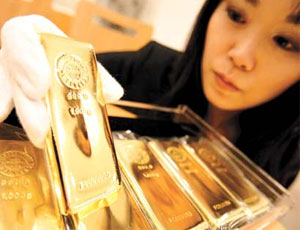China’s Pan Asia Gold Exchange: A New Playing Field for Speculators?
 By Vivian Ni
By Vivian Ni
Oct. 11 – In an age when the assets of insolvent Western economies are becoming less reliable and international investors appreciate gold as a safe haven, the Chinese know it is time for them to play a larger role in the global gold market. The Pan Asia Gold Exchange (PAGE) – opened earlier this year allowing gold trade in China’s own local currency RMB – may make China the new epicenter of the global gold market and even trigger a bigger wave of speculative gold buying and selling.
Established on March 31 this year, the PAGE is located in Kunming, the capital city of China’s southwestern Yunnan Province (an area well-known as a major gateway to Southeast Asia). The new gold exchange – which markets itself as China’s “gold supermarket” – will allow individuals to buy physical gold or speculate in gold future contracts through an RMB account with a bank or broker. Initially, all the clients of PAGE’s two settlement banks – the Agricultural Bank of China and Yunnan’s local Fudian Bank – will be able to buy 10-ounce T+D contracts on the PAGE.
While average Chinese citizens have already gained access to purchasing and owning physical gold with the opening of the Shanghai Gold Exchange in 2002, the new exchange in Yunnan will enable people to buy gold and silver more easily at home from their computers, according to analysts.
International investors will also find access to the RMB through these gold contracts once they are allowed to purchase International Spot Contracts on the PAGE.
In addition, the PAGE aims to establish an over-the-counter gold market, where its gold price fixed at 8:00 a.m. every morning local time will be recognized as the daily opening price of the global gold market.
A recent Forbes magazine editorial written by Robert Lenzer believes the impact of the PAGE will be huge, because it will enable the RMB – instead of U.S. dollars – to become the dominant currency in one of the most important speculative commodities for the first time. Furthermore, the PAGE’s integration with global gold market operations will likely head the spot market in gold for China away from London’s Metals Exchange or the New York Mercantile Exchange and Commodity Exchange (COMEX).
The PAGE may also rise as an alternative playing field for global gold investors because of the potential changes it brings to the existing mechanism in dominance. On PAGE, a gold buyer will be able to receive a 90-day International Spot Contract and actual title to the gold he/she purchases, while currently, the spot price of gold is still greatly impacted by London’s futures market. For every purchase of paper gold, both the London Bullion Market Association (LBMA) and COMEX are supposed to only have 10 percent allocated contracts backing them, and the other 90 percent is held in unallocated accounts.
Analysts looking on the bright side believe the emergence of the PAGE will help break the LBMA members’ market monopoly and bring greater transparency to the market as gold will be priced in terms of an alternative currency.
However, Lenzer uttered his concern over effective regulation on the market. It may become more difficult for the Western gold market regulators – who often have an interest in seeing a reduced gold price – to govern China’s action. As a result, the little controlled speculative fervor may drive gold prices to a new high and investors may see greater price discrepancies between the exchanges.
Related Reading
Pros and Cons of Gold as a Hedge Against Inflation
China to Launch Iron Ore Price Index
- Previous Article Dongguan Clarifies Terms for IIT Declaration
- Next Article China Bails Out Its Banks













